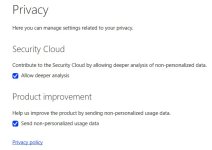You need to use antispy tool like O&O ShutUp10+ or similar software to minimize the data collection by MS
I strongly disagree with this one. People should stop using "telemetry blockers" because all they do is cause problems and slow down your PC–that's a fact!
Telemetry can only be disabled in Enterprise and Education version of Windows, all other Windows editions are required to send telemetry data to Microsoft. And no software or even hardware could help you to stop that. Microsoft owns billions of domains which are used for telemetry; there will always be a domain which you didn't block. And even if you managed to do so, your Windows installation will be unusable.
Every time you block telemetry domain, Windows tries another one until it reaches their server. This is where and why Windows becomes slow and eventually freezes/crashes. That's why my advice for everyone is to stop with this crap and give up because all you will get are the problems—nothing else. Either buy Enterprise (or activate it by using "you know!" methods) or just switch to Linux.
If you are using Windows, Microsoft will most definitely find different ways to collect data about you, just like any other software would that you use on the platform. It's not unique to Windows, but it's worth being aware of.
But let's be real. Microsoft is not going to find any exciting secrets in my online browsing history or digital footprint. It'll just be a bunch of forgotten bookmarks, abandoned shopping carts, or a lingering presence on social media. So, I say go ahead, collect all the data you want, I'm just over here living my best (and most unremarkable) online life, completely unbothered by digital snooping.
Once paranoia sets in, that's when the actual problem begins.
Are you saying privacy isn't important to you?
Then why do you keep your passwords secret? Just send them to us along with e-mail addresses. I mean, what's the difference if Microsoft or I have access to your account? None.
Privacy isn't the only problem with Defender and SmartScreen. SmartScreen collects full URLs of every website you visit. URLs are often known to collect private information and you can even sometimes access user accounts and private files just by having a URL. None of that would be a problem if Microsoft didn't send and store those on their servers in PLAIN TEXT. And if you know anything at all about security, you realize that it's a big NO-NO.
There's no security without privacy. These go hand in hand together.
Indeed. Privacy is an overblown issue, because data collection overall is so out of our control. Today I received yet another notice of third party data breach. We're mostly helpless with regards to digital privacy.
This is what companies are making you think because it's in their interest.
"Boo-hoo! Privacy on the web doesn't exist, give up!"
It does exist, you just have to find the path to it. And to achieve that, you need to look from the beginning to the end without any compromise.
Want an example?
1. step – buy your own router to get rid of ISP snooping on you and your devices
2. step – install physical VPN hardware (VPN router)
3. step – install private Linux distro on your PC
4. step – connect to another VPN service on the PC
5. step – use a private web browser with content blocker like uBlock Origin and make it clear all website data on exit
It can be done. It's just there aren't many people that will go through all of this just for privacy. Except criminals.
When you already use a Microsoft operating system, why introduce a third party (AV) to share your data with?
Just because Microsoft collects some data, doesn't mean we should give them absolutely ALL data about us. Also, it's never recommended to stick with just one company for everything.

